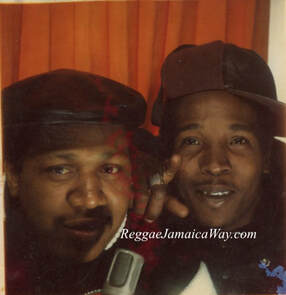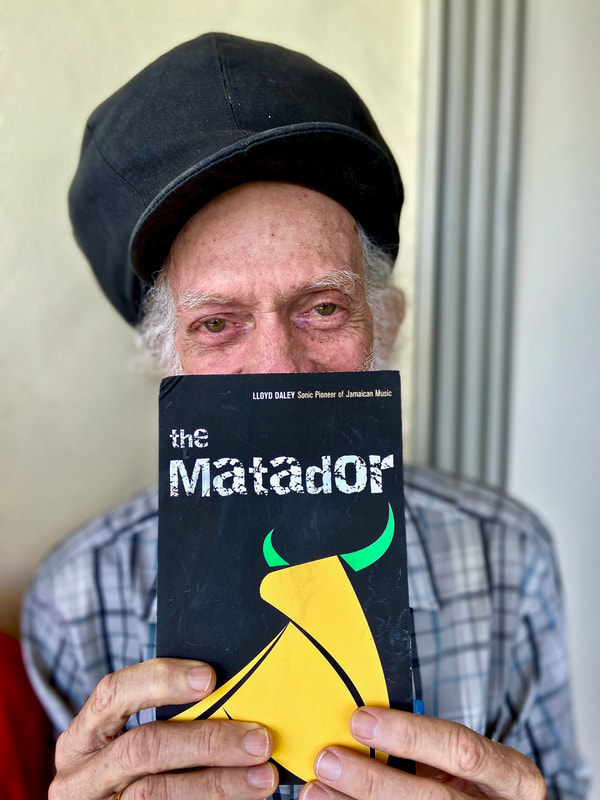 Lord Sassafrass (left) and Echo Minott (right) in the early days. Lord Sassafrass (left) and Echo Minott (right) in the early days. Noel Phillips a.k.a. “Echo Minott” was born and grew up in Maverley and he attended my mother Gertrude Dixon’s basic level school that she started when she lived in Trenchtown. Lord Sassafrass’s mother started a school at their home called Maverley Basic School. Mi know Echo’s mother and the family name was Marshall. He used to live five houses around the corner from me on Amsterdam Road first, and I lived on Denver Crescent. He was younger than me and I know Echo as a lickle baby. Me give him a hard time growing up because he say he want to be a DJ. I tell him I don’t want to see no DJ around me – all mi want to see is singers. So him come and sing and I say that no good! Every time him sing, I give him a hard time. I tell him the song is no good. When him tun big, he tell me, “I know what you was doing! Every time you would run me, I’ll come back harder Sass.” He say he know, and that’s why he’s where he is now. Up to this day, he still call me Teacher. I gi’ Echo Minott the mic on Black Scorpio Sound System man! The first song he buss in a dance was “Farmer Man” that he recorded for producer Junjo Lawes. Echo was a little tough kid that always run competition with me. Him say he can play soccer better and him can run faster than me, so me and him always clash from him lickle – that guy. One time he thief my lyrics book, where I write down all the songs I sing. I go over his house and find the book. I wasn’t mad! Great him a go get great now man! Echo Minott go to Black Scorpio, Jammy$, and Volcano Record label as a singer and got big singing songs. He was one of the first singers to record at Jammy$ after Jammy split off from King Tubby. His voice is unique because he used to sing in a calypso style on reggae songs. People would even think that he come from Trinidad. You can hear this style on his song “What The Hell The Police Can Do,” when he sings the phrase about how he and his girl were fighting. Minott created huge dancehall hits like Lazy Body,” “Been Around The World,” “Cheo Cheo” with General Trees, and “Cool and Deadly.” The Black Scorpio super hit by Echo Minott called “Lazy Body” was recorded by Chris Meredith and Paul Blake’s Drummer. Surprisingly, there is no guitar in it at all. When first asked to voice the song, Echo Minott did not want to sing on it at all. He did not want to record for Jack because he was much more interested in working with Jammy$. The song became a monster hit for Black Scorpio. Now Echo Minott is a producer, and he works on big stage shows, and travels the world.
0 Comments
The Matador - Sonic Pioneer of Jamaican Music book is now available in the form of "expanded distribution" for order at Book Stores and distributors via Amazon - worldwide.
Check it out using the button below ! By Dan Polletta
PUBLISHED - February 7, 2020 TOPICS - Arts & Culture IDEASTREAM E-NEWS In 1982, Rich Lowe was a student at John Carroll University hosting a reggae program on the campus station, when a recording he had purchased at a record convention caught his eye. “I was playing some of these Jamaican seven-inch singles. One of them had a hand stamp that said, ‘Daley’s Television and Radio Repair Service.’ It was just very, very intriguing to see a hand stamp on a record. I didn't understand what that was until years later,” Lowe said. Lowe, who spent nearly four decades as the host of the weekly reggae program, “Night of the Living Dread,” on Case Western Reserve University station WRUW, began looking into the story behind the name stamped on the recording. Lowe discovered that “Lloyd,” was Lloyd Daley, an important sound system operator, producer and electronics engineer, who, beginning in late 1950s, was one of the first to document Jamaican music during what was known as the “shuffle period.” Lloyd continued to produce recordings into the 1980s and worked with many important performers including Dennis Brown, Count Ossie and Alton Ellis. However, Lowe found that almost no interviews existed with Lloyd himself. Lowe learned why, as he began the research that led to his new book about Lloyd, "The Matador" (Jamaica Way Publishing). Lowe described Daley as a "middle-class, clean cut well-dressed guy who produced deep Rastafarian music," who became disillusioned with the music business. Daley said others had pirated his work, as well as that he feeling that he didn't receive the credit he deserved as an important figure in Jamaican music. There were also numerous run-ins with powerful figures who tried to eliminate Daley from the scene, including destroying his equipment, according to Lowe. Daley’s strong personality often led him to butt heads with others, which earned him his nickname. “He was feisty. He was the type of person who had great willpower, so that's where he got the name, ‘The Matador,’ because he was this young guy taking on these other powerful people, like a bullfighter would take on a bull,” Lowe said. Despite numerous requests from major music publications, Daley retreated from public view, refusing to do interviews. Though he knew Daley wasn’t amenable to interviews, in 2014, Lowe sent a letter to Daley’s home in Kingston asking for the opportunity to speak to him in the hopes of writing a book about him. To Lowe’s surprise, he received a reply a week later. “I don't know why he opened up to me. In some sense, I think he was waiting for the right person to come along with what he called ‘the vibes.’ He said ‘it was the vibes that caused me to open up to you more.’ We talked for four years almost on a daily basis. He told me just about everything,” Lowe said. During their frequent phone conversations and email correspondence, Lowe witnessed firsthand why Daley was known as “The Matador.” “He was always feisty. If I asked a question the wrong way, he might get really mad at me. That's who he was, and that's why he didn't open up to others. He would flatly refuse to communicate with other people,” Lowe said. Lowe came to understand quickly the best way to speak to Daley. “I was polite. I was honorable. I never did anything to offend his position in music. I was very delicate in how I dealt with things, but also, conversely, very honest and open and blunt sometimes. I would ask him the direct questions, Lowe said. In addition to his extensive conversations with Daley, Lowe interviewed numerous musicians as well as Daley family and friends for his book. Time after time in those interviews, Lowe’s subjects told him they couldn’t believe that Daley was willing to speak with him, given his reluctance to share details of his life. Although Daley died prior to the completion of “The Matador” in 2018, Lowe feels the reggae great appreciated the opportunity to share his story. “He was pleased with the progress of this book. I think he got a chance to share his history. I think he was very happy about it. I know that this is part of his legacy,” Lowe said. |
Archives
March 2024
|


